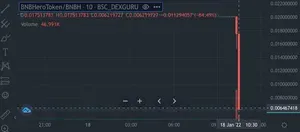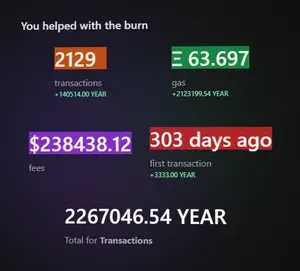OpenSea outage dampens Twitter feature launch, highlights centralization among popular web3 services
Kingfund Finance rug pulls for $141,000
Multichain publicly announces a vulnerability, and is quickly hacked by attackers using it
Mastercard spins a partnership with Coinbase as addressing "accessibility" and "inclusivity"
Once popular play-to-earn game BNB Heroes rug pulls after a period of inactivity from the team
Creator of "MetaBirkins" NFTs writes that he "won't be intimidated" by a trademark lawsuit from Hermès
I, for one, am very curious to see how the litigation plays out. In the meantime, the Rarible landing page for the connection displays an error message stating, "This user or item has been temporarily blocked from public access".
At least $34 million is stolen from users of Crypto.com
Although some users reported funds missing from their wallets, including one investor who reported that $16.3 million missing, Crypto.com announced that "All funds are safe". Over the next few days this was revealed to be untrue; as of January 20, the total estimated funds stolen from the platform had reached $30 million. Large amounts of stolen funds were quickly laundered through Tornado Cash, a popular crypto mixer.
Mysterious NFT project NotASecretNFT gets people to authorize a shady contract after leaving clear clues to their intentions
CryptoBurgers play-to-earn game is hacked shortly after launch
SpiceDAO wins a $3 million auction to buy an extremely rare storyboard book of Dune, only to learn that owning a book doesn't confer them copyright
Developer apparently rug pulls two NFT projects at once
Chinese police arrest eight people over a $7.8 million rug pull
An attacker pulls about 350 ETH from Float Protocol's Rari Capital pool
Voice actor Troy Baker announces his involvement in "voice NFT" project Voiceverse with an antagonistic tweet, shortly before it's revealed that the project stole work
Token drop for the aptly named WTF token devolves into chaos
Global Game Jam plugs their blockchain company sponsor, then tries to scrub mention of it after backlash
NFT developers rugpull for a third time, this time with "Big Daddy Ape Club"
The Associated Press announces its bizarre plans for an NFT marketplace
Members of a DAO hoping to build an Ethereum city in Wyoming are scammed out of around $100,000
Sports NFT platform Lympo loses $18.7 million to a breach
Celebrity-promoted Rich Dwarves Tribe NFT project rug pulls for around $3 million
Developers of the Frosties NFT project make off with about $1.1 million
Doodled Dragons takes at least $30,000 after tweeting "our charity will instead now be... my bank account"
$6.8 million emptied from crypto exchange LCX
Gary V announces his new "NFT restaurant" where you'll still have to pay regular money for your meals
Class action lawsuit names Kim Kardashian and other celebrities who hyped Ethereum Max
Users of Hong Kong crypto exchange Coinsuper reportedly haven't been able to withdraw funds for several months
SEC sues CrowdMachine founder, alleges illegal ICO and operation that secretly diverted funds to gold mining companies
Mozilla pauses cryptocurrency donations after backlash
Internet shutdown in Kazakhstan reveals that 12–18% of all Bitcoin mining is done there, which has alarming energy implications
Pudgy Penguins NFT project founders apparently try to make off with all the money they've raised
Artist discovers her work has been stolen and published as 86,000 NFTs
Kosovo issues an emergency ban on cryptocurrency mining in efforts to ease electricity shortages
Franklin apologizes for shilling an NFT project (that later rug pulled) without adequately disclosing he was being paid
Solana experiences outage or "congestion", depending on who you believe
After being hospitalized for digestion issues after selling farts in a jar (really), a former 90 Day Fiancé star turns to NFTs
The Sunflower Farmers blockchain game DDoSes the Polygon blockchain for several days
ArbixFinance appears to rug pull, making off with at least $10 million
Samsung announces its new smart TVs will include an NFT marketplace
Crypto gambling service Polymarket shut down and fined $1.4 million by the U.S. CFTC
Matt Damon stars in a truly cringeworthy ad for Crypto.com
Blockchain game CryptoBike apparently rugpulls only days after launch
- "CryptoBike showing signs of scam", Sài Gòn Giải Phóng
- "Dự án game NFT Việt bị nhà đầu tư 'săn lùng' ra cả địa chỉ giả do dùng chiêu cho chiếm đoạt 1,4 tỷ USD rồi bỏ trốn", Diễn đàn Doanh nghiệp
Some of Tinyman's liquidity pools are drained of around $3 million
NFT collector loses $38,000 in what he believes is an OpenSea or Rarible glitch
Digiconomist reports that Bitcoin consumed about as much energy in 2021 as the whole country of Argentina
Tether, the stablecoin that claims to be fully backed by actual currency, adds $1 billion to their supply
Square Enix CEO acknowledges he will be disappointing gamers who "play to have fun" with his announcement that they are getting into web3
$YEAR creator rings in the New Year by rugpulling about $225,000
- "Airdrop culture could pose integral threat to DeFi industry", Cointelegraph
- "Ethereum Project Airdrops Scam Token, Then Pulls the Rug", Crypto Briefing
NFT collector scammed out of $2.2 million in a phishing attack
"I been hacked. all my apes gone." tweeted Kramer, in a phrase that ultimately became a catchphrase of the NFT world (and its critics).
After asking for help on Twitter, OpenSea froze the stolen assets, preventing them from being traded on their platform. Some commenters noted that the redress (asset freezing and flagging of suspicious accounts) was only possible because OpenSea is a centralized platform with a large amount of power in the NFT arena, which some see as antithetical to the supposed ideals of web3. This also raises the question of whether BAYC themselves have a way to determine "legitimate ownership" of their NFTs, which in addition to being expensive status symbols also grant their owners exclusive perks including merchandising rights and access to events.
p>










































